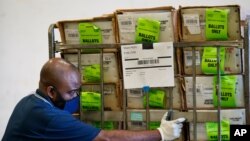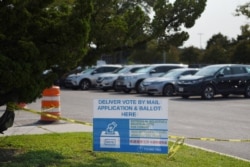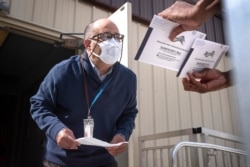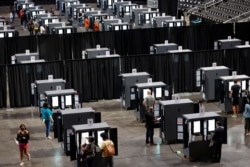With three weeks still to go before the Nov. 3 U.S. election, millions of Americans have already cast their ballots by mail or at early voting sites across the country.
In the face of the coronavirus pandemic and a push by many states to make it easier to vote by mail, there are estimates that half or more of all ballots cast will be by mail or through early voting, according to a Brookings Institution study.
But as the election approaches, a months-long partisan battle over how votes are cast and counted is escalating in the courts, underscoring the stakes and foreshadowing a possible drawn-out post-Election Day fight if the results of the presidential contest are close.
In a ruling late Monday night, a federal appellate court reinstated Texas Gov. Greg Abbott’s recent directive limiting the number of places voters can drop off their ballots ahead of the election to one per county.
Several civil rights organizations had challenged the order. In many cases, the counties in Texas are so large that would-be voters — including the elderly and handicapped — would have to drive hours to reach the drop-off point.
In Pennsylvania, a similar legal battle over ballot drop boxes led to a different outcome.
A federal judge on Saturday dismissed a lawsuit filed by President Donald Trump’s re-election campaign that sought to limit the number of ballot drop boxes in Pennsylvania for security reasons. Pennsylvania Democrats and civil rights groups had opposed the lawsuit. The Trump campaign said it would appeal.
The two cases are among hundreds filed since the coronavirus pandemic broke out earlier this year, forcing millions of Americans to hunker down in their homes just as primary elections for presidential and Congressional candidates were getting underway.
In response, states expanded mail-in voting so people could vote without exposing themselves to the coronavirus. Where states demurred, Democrats and their allies turned to the courts to loosen the rules. For their part, Republicans have adopted what they call a “defensive strategy,” challenging rule changes advocated by the Democrats.
Trump has repeatedly argued that voting by mail, except in limited circumstances, has unleashed widespread fraud. However, studies have turned up little evidence to support the claim, and Democrats insist that the president and his allies are waging war on voting by mail or dropping off ballots ahead of the election to suppress the Democratic vote.
The stakes in the legal fight over voting are high for both Trump and his Democratic rival, former vice president Joe Biden. In June, Trump told Politico that he viewed losing election-related lawsuits as his "biggest risk."
In July, Biden said his campaign had assembled a team of 600 lawyers to fight possible Republican "chicanery" in the election.
Both campaigns are believed to be spending millions of dollars on election-related litigation.
According to a database maintained by the Stanford-MIT Healthy Elections Project, more than 300 election-related cases and appeals have been filed in state and federal courts since March, making this election cycle the most litigious in history.
The vast majority of the lawsuits have been filed in a dozen or so battleground states that hold the key to the outcome of the election.
The Democratic lawsuits pursue four broad objectives, according to the election litigation website, democracydocket.com: providing free postage for mail-in ballots; relaxing signature-matching requirements; allowing third parties to deliver multiple ballots in a practice known as ballot harvesting; and extending the deadline for counting mailed-in ballots by several days.
The Republicans oppose all four "pillars" championed by the Democrats, saying changing the election procedures will eliminate safeguards against fraud.
In a statement to VOA, Michael Thielen, executive director of the Republican National Lawyers Association, said "lawyers should not try to change, through last-minute litigation, clearly written rules and procedures enacted to ensure that only legitimate votes are cast and counted."
"The large volume of litigation we have seen this year risks creating chaos and confusing voters, especially when changes are made close to the election or when voters are already voting," Thielen said.
Paul Smith, Vice President for Litigation and Strategy at the Campaign Legal Center and a Georgetown University law professor, said lower courts in general have been "pretty receptive to arguments about how things need to be fixed to make it easier and safer for people to vote."
"When there are 300 lawsuits, you can't overgeneralize, but by and large there has been a lot of success," Smith said.
The Campaign Legal Center unsuccessfully sought to block the Texas governor's order limiting the number of ballot drop boxes. But in other states, it has had succeeded at times in getting officials to change their procedures.
"Very often these states when you sued them this year have said, 'Well, you're right' and they just agreed to do it," Smith said.
With few exceptions, courts have allowed states to adopt all-mail voting, rejecting Republican arguments that it will create opportunities for fraud. Prior to the pandemic, 34 states allowed no-excuse-required absentee voting. Now, all but five states — Indiana, Louisiana, Mississippi, Tennessee and Texas — either automatically send ballots to voters or allow no excuse-required absentee voting.
However, on a number of hot-button issues related to voting by mail, including ballot drop boxes, the courts have issued a mixed bag of rulings in recent months, leading both sides to claim victory.
In another win for the GOP, a federal appeals court on Friday reinstated Ohio’s decision to limit the number of drop boxes to one per county — the same as in Texas. Among other recent Republican victories: A federal appeals court last week reinstated a Georgia law that all voters must return their absentee ballots by Election Day, and the Supreme Court restored a South Carolina requirement that all mail-in ballots must be signed in the presence of a witness.
For their part, the Democrats claim at least three dozen legal victories across the country. In tossing out the Trump campaign lawsuit over ballot boxes, U.S. District Judge Nicholas Ranjan, a Trump appointee who presides in Western Pennsylvania, also dismissed the Republican claims of widespread fraud.
“I think it’s been a very mixed outcome,” said Sarah Brannon, a managing attorney with the ACLU National Voting Rights Project of the recent election-related court rulings.
Tom Spencer, a veteran Republican election lawyer and vice president of the Lawyers Defense Fund, said that despite some success the Democrats “have lost most of the time on securing free postage, and on eliminating signature-match law.”
“They’ve also generally lost on ballot harvesting,” Spencer said. “The Republicans have generally been successful in connection with extending the election day.”
Some of the Republican success is thanks to the conservative-controlled Supreme Court. In recent months, the high court has delivered a string of rulings against Democratic and voting rights advocates in Alabama, Florida, South Carolina, Texas and Wisconsin.
In the coming weeks, the courts are unlikely to allow changes to the election rules. That is because of a relatively recent legal doctrine known as the Purcell Principle. The doctrine holds that federal judges should not make last-minute changes to the election procedures that could potentially create confusion for both voters and election officials.
Whether a fresh round of litigation ensues after the Nov. 3 vote will depend in large part on the winner's margin of victory. If the results are close, experts predict a legal fight that will likely make the dispute over the contentious 2000 presidential election pale by comparison. Spencer called post-election litigation "the big gorilla in the room."
Trump has refused to commit to accepting the outcome of the election, saying he wants to first see whether there are indications of irregularities or fraud. Biden has said he would accept the outcome, provided there is a full count of votes.








